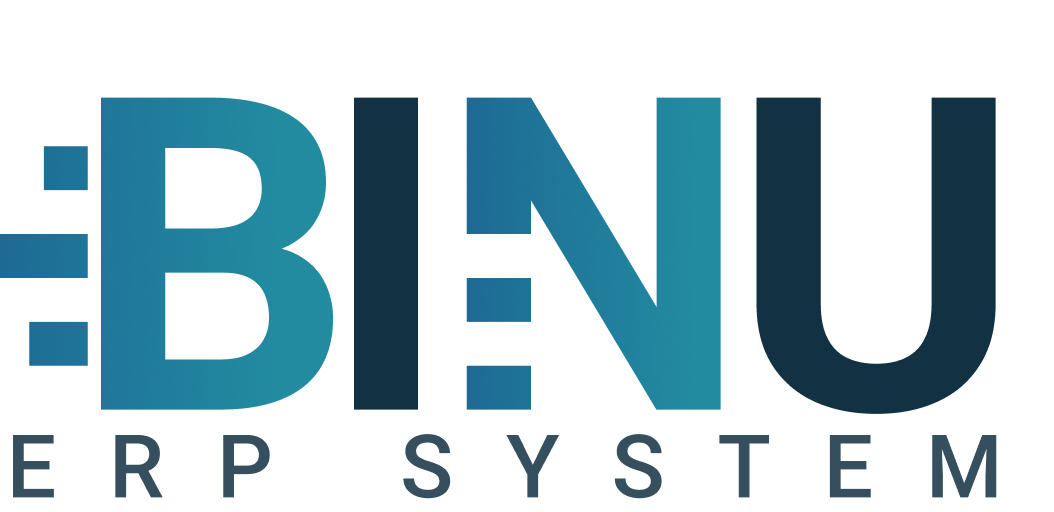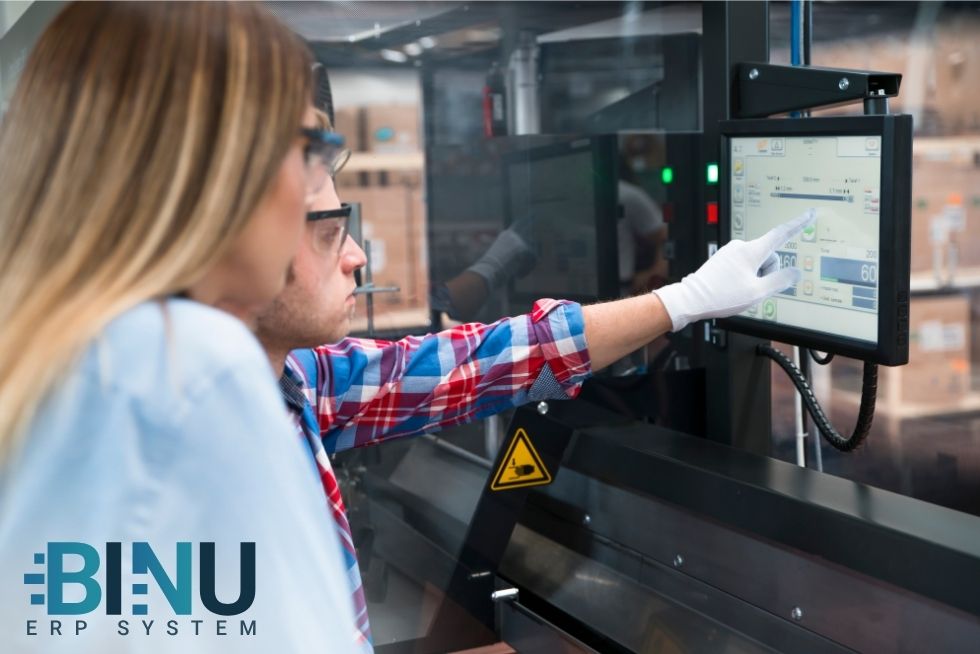Table of Contents
1. Introduction
Digital Transformation is rapidly reshaping the manufacturing industry, driven by cutting-edge technologies like IoT, AI, and cloud computing. In 2025, digital transformation is no longer optional—it is essential for small and mid-sized manufacturers (SMBs) looking to enhance efficiency, quality, and scalability. According to industry experts, companies that fail to embrace digital transformation risk falling behind in an increasingly competitive landscape. This article explores how SMB manufacturers are leveraging technology to stay competitive and how ERP cloud systems, like Binu ERP, play a crucial role in this transformation.
2.Top Digital Transformation Trends for SMB Manufacturers in 2025
In the past, manufacturing companies often relied on traditional methods like paper-based processes, manual tracking, and siloed systems to manage production, inventory, and operations. While these methods worked for a time, they have become inefficient, error-prone, and difficult to scale in today’s fast-paced, data-driven world. Digital transformation addresses these challenges by integrating advanced technologies like AI, IoT, and cloud computing into the manufacturing process, offering SMBs a way to improve efficiency, reduce costs, and enhance product quality.
To remain competitive in 2025, SMB manufacturers must stay ahead of these emerging digital transformation trends:
- AI and Machine Learning: AI-powered automation streamlines processes, reduces human error, and enhances decision-making
- IoT and Smart Devices: Real-time monitoring through connected devices improves efficiency and predictive maintenance. ERP cloud systems, such as Binu, collect and analyze data from IoT devices, providing real-time insights into production processes, and enabling manufacturers to make proactive adjustments.
- Sustainability and Green Manufacturing: Digital solutions help manufacturers reduce waste and minimize their carbon footprint.
- Predictive Analytics: AI-driven analytics forecast equipment maintenance needs, preventing costly breakdowns
3. Key Benefits of Digital Transformation for SMB Manufacturers
SMB manufacturers leveraging digital technologies experience numerous benefits, including:
- Enhanced Efficiency: Automation reduces manual labor, minimizes downtime, and increases production output.
- Improved Product Quality: AI-driven monitoring ensures consistency and reduces defects.
- Cost Reduction: Predictive maintenance and automation lower operational costs.
- Greater Agility: Digital tools help manufacturers respond quickly to market demands.
- Data-Driven Decision Making: Real-time analytics empower informed, strategic decision-making.
4. Digital Transformation Trends in Manufacturing 2025: Case Studies
Many SMB manufacturers have successfully adopted digital transformation, resulting in significant improvements in their operations. Here are some real-world examples of digital success stories:
- IoT-Powered Efficiency: A small electronics manufacturer integrated IoT sensors into their production line, reducing downtime by 20% and increasing productivity by 15%.
- AI-Driven Quality Control: A midsized automotive parts manufacturer implemented AI-powered quality inspection, leading to a 25% reduction in defects.
- 3D Printing for Faster Prototyping: A furniture manufacturer adopted 3D printing technology, cutting prototyping time by 50% and accelerating product development.
5. The Role of ERP Cloud Systems in Digital Transformation for Manufacturing
ERP cloud solutions like Binu ERP integrate essential business functions, helping SMBs streamline operations and maximize efficiency. Key advantages of ERP adoption include:
- Real-Time Inventory Management: Track raw materials, work-in-progress, and finished goods with precision.
- Optimized Production Planning: Ensure seamless scheduling and resource allocation.
- Supply Chain Visibility: Monitor supplier performance and inventory levels in real-time.
- Financial Control & Compliance: Centralized financial management simplifies budgeting and reporting
6. Key Strategies for Overcoming Digital Transformation Challenges in SMBs
Despite the benefits, SMBs face several challenges in adopting digital transformation. According to industry experts, the most common obstacles include:
- Budget Constraints: Many SMBs lack the financial resources to invest in large-scale digital upgrades. Strategy: Start with incremental digital initiatives and seek government grants or industry funding.
- Skill Gaps: Employees may not have the expertise to work with new digital tools. Strategy: Invest in ongoing employee training and partner with technology providers.
- Cybersecurity Risks: Increased connectivity can expose businesses to cyber threats. Strategy: Implement robust cybersecurity protocols and conduct regular security audits.
- Resistance to Change: Employees and management may be hesitant to adopt new technologies. Strategy: Foster a digital-first company culture by demonstrating tangible benefits and providing adequate support during transitions.
7. Conclusion: Why SMB Manufacturers Must Embrace Digitization in 2025
Digital transformation is no longer a luxury but a necessity for SMB manufacturers aiming to stay competitive in 2025. The integration of AI, IoT, predictive analytics, and ERP cloud solutions streamlines operations, enhances efficiency, reduces costs, and improves overall product quality. Successful adoption of digital tools empowers SMBs with data-driven decision-making, sustainability practices, and the agility needed to adapt to market changes.
By overcoming common challenges such as budget constraints, skill gaps, and cybersecurity risks, manufacturers can fully leverage digital transformation to scale their businesses and drive innovation. Investing in the right technologies, fostering a culture of continuous learning, and implementing strategic digital initiatives will ensure long-term success in the ever-evolving manufacturing industry.
8. FAQs
- What is digital transformation, and why is it essential for SMB manufacturers in 2025 ?Digital transformation is the integration of technologies like AI, IoT, and cloud computing into manufacturing operations. For SMB manufacturers, embracing these changes is crucial to stay competitive, improve efficiency, reduce costs, and scale operations in 2025.
- What are the key digital transformation trends for SMB manufacturers in 2025? Key trends include AI-powered automation, IoT for real-time monitoring, sustainability practices, and predictive analytics. ERP systems like Binu ERP are essential for leveraging these technologies to optimize manufacturing processes.
- What challenges do SMB manufacturers face in digital transformation, and how can they overcome them? Challenges include budget constraints, skill gaps, and cybersecurity risks. SMBs can start with incremental digital initiatives, invest in employee training, and implement strong security measures with ERP solutions like Binu ERP.
- How does digital transformation improve decision-making for SMB manufacturers? Digital tools like ERP systems provide real-time data, allowing manufacturers to make quick, data-driven decisions, improving efficiency and responsiveness to market changes.
- How will ERP systems evolve in the future of digital manufacturing? Future ERP systems will integrate more advanced AI, IoT, and predictive analytics, offering smarter automation, forecasting, and enhanced cybersecurity—empowering manufacturers to stay efficient and competitive.
- How do ERP cloud systems, like Binu ERP, enable digital transformation in manufacturing? Binu ERP centralizes data, automates workflows, and provides real-time insights. It helps SMB manufacturers streamline operations, improve decision-making, and achieve higher efficiency and cost savings.
- Why must SMB manufacturers embrace digitization in 2025?
Digitization is key for SMB manufacturers to remain competitive in 2025. It streamlines operations, improves quality, reduces costs, and enhances scalability. Embracing digital tools like ERP systems ensures greater agility and data-driven decision-making in a fast-evolving market.

